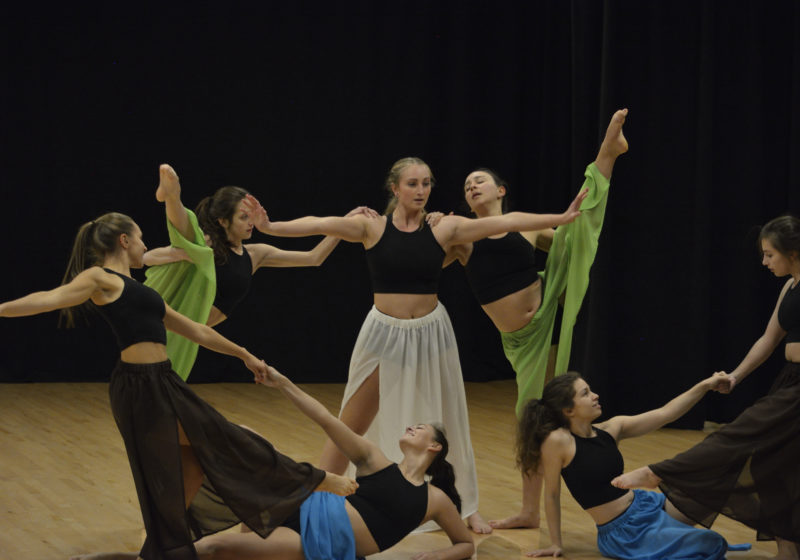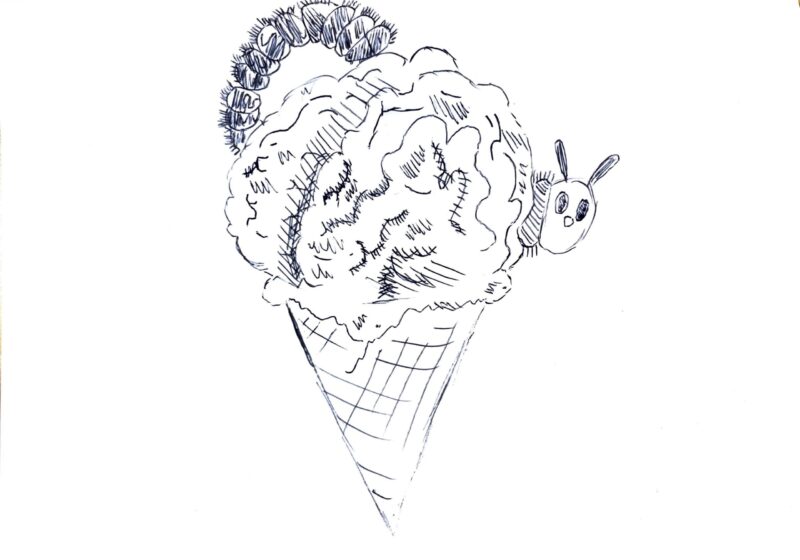Louvre Performance Ensemble’s fall show, “rise.”, will feature dances depicting issues like addiction and abuse. That’s one reason it holds importance for senior Emily Trowbridge and junior Amanda Waugh.
Performed at 8 p.m. on Saturday, Nov. 10, and 5 p.m. on Sunday, Nov. 11, it will also be Trowbridge and Waugh’s last show as president and vice-president, respectively.
Trowbridge and Waugh agreed dealing with the issues in the show was stressful. To avoid treating these issues lightly, they said, they made sure that the dances, choreographed by members of the ensemble comprised of 12 dancers, all trained, were coming from a place of honesty.
“[A]ll of the dances […] come from what the choreographers are passionate about,” Waugh said. She choreographed the opening dance, called “Balance,” which confronts climate change. “Balance” begins very symmetrically, with seven dancers in green, blue, brown, and white skirts. But it grows increasingly despairing as dancers collapse to the floor as if ill.
Before “Balance,” a recording is played of a spoken word piece called “Mother Earth,” written by junior Miles Perry — billed as Made in Mind — and performed by first-year Yarnetta Leonard — billed as Be’On the Sage — both from No Disclaimers. The piece addresses not only climate change but the violence of humanity. “Whether through greenhouse gases or green trees with nooses/ Mother your children are dying and I’m sorry.”
“Balance” ends on a hopeful note, as do other dances like “Logged In,” by junior Lydia Currie, about bullying on social media. But not all are like this.
“Behind the Wall,” by senior Nicole Gorski, discusses abusive relationships. Featuring seven worried-faced dancers in torn gray shirts, the movements of the dance suggest violence and fear.
“Behind the Wall” is followed by two Louvre performers reading abuse statistics. The National Domestic Abuse Hotline is provided on the program for “rise.”
Another of the show’s darker numbers, “#MeToo,” choreographed by sophomore Alina Mueller, is described in the program: “This dance shares my #MeToo story.”
Because some of the show’s subjects may be triggering, Trowbridge said, a content warning will be provided at the beginning of each performance, and University Counseling Center representatives will be available.
Trowbridge said that by being personal and representing their own voices, the group was able to avoid misrepresenting those of others.
“So a lot of what choreographers have been encouraged to do and certainly are doing is saying things that are very personal […] to them,” Trowbridge said. “So we’re never pinpointing direct things audience members should be doing.”
Trowbridge and Waugh credit Louvre’s ability to discuss these topics through dance to the ensemble’s technical skill.
Waugh described Louvre as more art-focused than technique-focused, but added that “it’s coming from a deep foundation of training in technique, which I think is what allows us to focus more on exploring other sides of dance[.]”
When asked about the importance of trust in Louvre, Trowbridge and Waugh — who attended their last e-board meeting as president and vice-president the same day as speaking with the Campus Times — got diverted telling a story.
“Sometimes you drop someone on their face from six feet in the air but it’s okay,” Waugh said between laughs. (“Someone” referred to herself.) “I’m still here. I’m still dancing.”
Trowbridge said that she places a strong sense of trust in the choreographers. Judging by the issues the “rise.” choreographers address, Louvre takes that trust seriously.
Correction (11/15/18): The original version of this article incorrectly stated that Nicole Gorski, who choreographed “Behind the Wall,” is a junior. Gorski is a senior.




